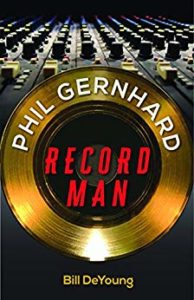 Phil Gernhard, Record Man, by Bill DeYoung
Phil Gernhard, Record Man, by Bill DeYoung
University Press of Florida
Score: 80
Bill DeYoung’s bio of record industry wearer-of-many-hats (producer, promoter, publisher) Phil Gernhard is a fast read. Perhaps not as fast as Gernhard was a hustler, but it’s 159 pages, and flew by in two days for me. Perhaps not because DeYoung gives you the ending in the first chapter, aptly called “Rosebud,” but because Phil Gernhard’s actions are almost as bizarre as that other Phil (Spector) and I was sucked into why it went down that way.
Other than that, Phil is not very different from many other music industry hustler types of his era and beyond, of which I met more than my fill (pardon the pun) in 40-plus years in the biz. You could say Gernhard had staying power that lasted for over 5 decades, starting with “Stay,” a monster hit by Maurice Williams and The Zodiacs (and later the Four Seasons). That was followed by many misses and some very big hits (which also defy explanation), e.g. Snoopy & The Red Baron, by a group of Florida teens called The Royal Guardsmen, who really wanted to be another Rascals. Instead, they were saddled at the insistence of Gernhard with Beagle Bubblegum, until Peanuts creator Charles Schulz thought he had heard enough and yanked his license. The last song of that series, “Snoopy For President,” also got pulled quickly because of real-time events, the assassination of Bobby Kennedy. Out of America’s tragedy though, came a tune from Dick Holler, the writer of those Snoopy dog tunes and longtime collaborator of Gernhard’s. Holler wrote the tune “Abraham, Martin and John” in about 15 minutes, but it would take a while longer for Gernhard to find the right singer for it, even though his Guardsmen group were chomping at the bit to cut it. Gernhard had to really smooth talk Dion, who was playing small folk clubs in Florida at the time, into doing it.
Most of Gernhard’s talent pool came from his home state of Florida. The Guardsmen, Jim Stafford (“Spiders & Snakes,”) Lobo (“Me and You and A Dog Named Boo”) and The Bellamy Brothers. He had a fairly long run with Lobo (real name Kent LaVoie ) until LaVoie got wise to how much money he was getting screwed out of, and a very short one with the Bellamy’s, but not before he found them their signature hit “Let Your Love Flow.”
Heading to LA in the ’70s, he meets Mike Curb, a fast-rising record exec, who winds up believing in Gernhard’s ears to pick hits and supported him almost carte blanche, until the bad ending in 2008. When Curb moved his organization to Nashville in ’92, Gernhard became an A&R head there and was involved with finding hits for Tim McGraw, Jo Dee Messina and Rodney Atkins, along with several other artists who fell through the cracks there.
The fact that author Bill DeYoung was turned down for interviews by artists Dion, The Bellamys, Tim McGraw and Jo Dee Messina, as well as industry folks like label head Doug Morris, producer Michael Lloyd and promoter Tony Scotti (who was a biz partner in LA), speaks volumes about Gernhard’s personality. More volumes come from the ones who did speak candidly, like Kent LaVoie, Jim Stafford and Rodney Atkins. Phil Gernhard was complicated. That said, his story is a complicated part of what has made pop music, in several forms, stay just a little bit longer.
—Ken Spooner







Thanks, Ken. My wife told me not to include the list of people who declined to be interviewed, but I thought it was important. You are the first reviewer who understood why,